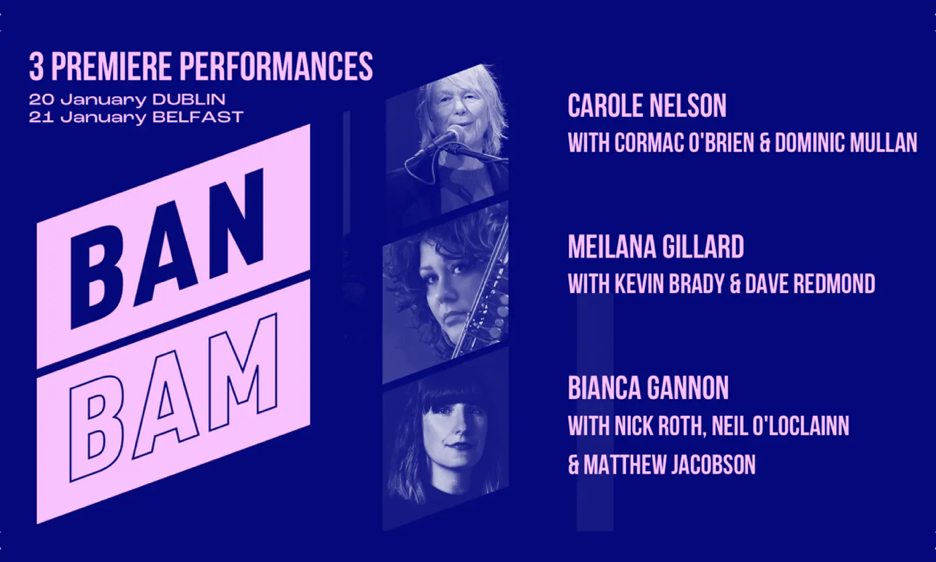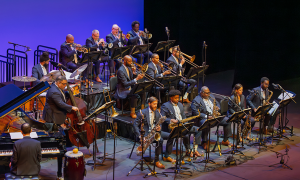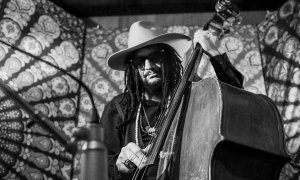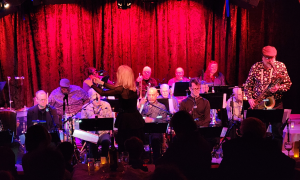Home » Jazz Articles » Live Review » BAN BAM: Bianca Gannon, Carole Nelson, Meilana Gillard a...
BAN BAM: Bianca Gannon, Carole Nelson, Meilana Gillard and RBG Trio At Crescent Arts Centre

BAN BAM
Crescent Arts Centre
Belfast, N. Ireland
January 21, 2024
What do an Indonesian candy floss seller, a Hawaiian bird and the video game Sega Genesis all have in common? Well, in one way or another, and to different degrees, they all informed the music on a memorable BAN BAM (see below) triple bill in Belfast.
The artists in question were, in running order: Bianca Gannon, an interdisciplinary artist, pianist and percussionist; pianist/singer Carole Nelson; and saxophonist Meilana Gillard. All three leaders were presenting new music commissioned by Dublin promoters Improvised Music Company, who bring you the award-winning 12 Points Festival, and Belfast's Moving On Music, promoters of the city's annual jazz festival, Brilliant Corners.
BAN BAM ('ban bam' is a play on 'bean,' which means 'woman' in Irish) began life in Dublin in 2017. An Improvised Music Company initiative, the one-day festival-cum-discussion forum was launched to address the gender imbalance in jazz/improvised music. Since then, BAN BAM has been joined by Moving On Music, recognizing the adage that two heads are better than one. In a further positive step, BAN BAM has evolved into a biannual commission and development program for female and gender-minority artists island-wide.
The relatively small turnout meant that the Crescent Arts Centre's tiered seating was not required. Instead, tables topped with candles made for a cozy, club- like atmosphere, which was preferable in many ways.
Bianca Gannon
Award-winning composer and musician Bianca Gannon has dedicated much of her professional career exploring Indonesian gamelan and improvised music. That, of course, is the short story. Having returned to Ireland after the guts of twenty years abroad, Gannon's suite drew on her experiences in Australia and Bali, as well as her Irish roots. The suite's title, "We're all just Walking Each Other Home" takes its inspiration from a poem by Ram Dass (née Richard Alpert)—the American spiritual teacher and best-selling author.The piece began with Nick Roth on Irish whistle, channeling the Irish traditional air "Caoineach An Spailpin" A spailpin was an itinerant laborer, made homeless due to the evictions at the time of the Great Famine (1845-1852), a catastrophe that killed at least a million Irish and forced another million to emigrate, thus reducing Ireland's population by a quarter.
History is never far from one's heels in Ireland, and Gannon drew parallels to Ireland's present-day housing crisis. [Exorbitant prices and rents, compounded by a severe housing shortage, means that Ireland is experiencing record levels of homelessness, with the Housing Department recognizing that thousands are living in "emergency accommodation."]
To Roth's appropriately mournful whistle, Gannon gently ran a bow along the edges of bespoke gamelan metallophones. Drummer Matthew Jacobson's sharp tattoo ruptured the reverie, with Derek Whyte's probing bass (subbing for Neil O'Loclainn) and Roth—now on spiraling tenor saxophone— steering the music into heady improvised terrain. As the intensity waned, subtle percussive effects came to the fore; Bowed waterphone, impressionistic piano, and bird song courtesy of the ever-versatile Roth's soprano saxophone, sans mouthpiece.
Softly tinkling bells, dappled piano notes and little shakers combined, but the lull was brief. A pounding piano mantra and soaring saxophone upped the tension once more. Gradually abating, the growing space invited Gannon to play a circling piano motif with her left hand, while a mallet in her right hand deftly worked the gamelan.
Downing saxophone, Roth picked up sticks and rattled a small wooden box festooned with pairs of finger-cymbals—the former tool of an Indonesian candy floss seller. The spirit of Indonesia was an almost constant presence throughout the suite. In the final stretch, over a bowed bass drone, prayer bowls previously distributed to audience members chimed with those on stage in a beautiful piece of choreography that dissolved the fourth wall and radically altered the spatial dynamics.
A gentle piano motif, the rumbling of mallets on drums, and a closing burst of Irish whistle brought the suite full circle. The final grace note was a communal hum—on cue—repeated three times.
A powerful, multi-layered and organic narrative that quite beautifully underlined the commonality of seemingly disparate musical cultures.
Carole Nelson Trio
Birdsong—and existentialism—also inspired the new piece by pianist/vocalist Carole Nelson. In 1987, a male of the Kauaʻi ʻōʻō family of birds, native to Hawaii, sang to attract a perspective mate. No reply came. The would-be suitor was, as he soon discovered, the last of his kind. Soon, his song too was silenced, marking the extinction of a species that began life 15-20 million years earlier. [see YouTube below]A field recording of the Kauaʻi ʻōʻō''s call found an answer in Nelson's delicate piano voicing, soon buoyed by Cormac O'Brien on bass, and Dominic Mullan on drums. Switching to Nord Electro 6 organ, Nelson carved a delightfully funky trail, with O'Brien plying a pulsing groove and Mullan unleashing a steady barrage of bass bombs, potent pressed fills and cymbal splashes. The ending of this section, titled "Eden," was symbolically abrupt. Terminal.
The second part, "Encroachment," stemmed from bowed bass, lightly stirring brushes and spare piano. Nelson's wordless vocals steered the trio from borderline abstraction in a more lyrical direction, though with lament at its core. A slow beat arose, ushering in a minor key solo from Nelson. Her playing, tinged with the blues, gathered emotive momentum without releasing a flood of notes. This balance of economy and feeling is a trademark of Nelson's playing with this trio, which has released three excellent albums at time of writing.
The trio signed off with "Beneath the Surface" from Arboreal (Black Stairs Records, 2020), an album whose theme of the threat to the environment complimented the "Last Song" suite. Rhythmically unrelenting, then meditative in turn, the music seemed to represent humanity's charge towards environmental destruction, and then offer a glimpse of a better alternative.
Thought provoking, musically and philosophically, which is what we have come to expect from Carole Nelson.
Meilana Gillard/RBG Trio
Together since 2019, bassist Dave Redmond, drummer Kevin Brady and saxophonist Meilana Gillard, aka RBG Trio, released their eponymous debut album in the autumn of 2023 on Auragami Records. A straight-ahead affair out of bebop's slipstream, but with influences ranging from soul to R&B, RBG Trio is an acoustic ensemble in style as well as spirt. So, the sight of mounted effects boxes and a pedal board by the saxophonist, and an electric bass strap over Redmond's shoulder signalled a radically new direction before a single note sounded.Greeting the audience, Gillard explained that the inspiration for her commissioned piece came from the video games she played as a kid growing up in Ohio. "I was always amazed the music could be so creative with so few voices," she explained. Drawing a comparison with the jazz trio, the Derry-based saxophonist expanded by saying that whereas some people might see restrictions or limitations in video game music, or indeed a jazz trio, in fact, Gillard argued, the stripped-down aesthetic is very freeing.
The four-part suite, "Chasing Comets" consisted of four parts: "Solar Flare;" "Supernova;" "Dark Matter;" and "Moon Tide."
From the start, Gillard toggled between an EWI-esque futuristic sound and acoustic tenor, while Redmond's own pedals brought a treacly funk viscosity to his bass sound. Just as big a transformation came in Brady's drumming—more urbane and modern sounding than his straight-ahead, swinging norm. If Joe Zawinul and Bootsy Collins had formed a band, it might have sounded something like this.
On "Supernova," a solo segment for saxophone, Gillard employed an arsenal of toys—echo, delay, harmonics and loops—to mesmerizing effect. Yet beneath the deep sonic make-up, Gillard's trademark lyricism and melodic compass were ever-present.
The trio united on the uber-catchy head of the slow-burning funk "Dark Matter," with Gillard's boxes of tricks adding a squidgy wah-wah quality to her searching tenor lines. A grooving bass ostinato announced the sultry "Moon Tide," with Gillard unfurling a smoking solo over Brady's head-bobbing beats. Jazz-funk at its sexiest.
Like Bianca Gannon and Carole Nelson before her, Gillard gratefully acknowledged Improvised Music Company and Moving On Music for their support. A little earlier, Gillard had remarked how thrilled she was at being able to try something creatively new without having to worry about its commercial viability.
Enjoying the freedom to take musical chances, to explore new sounds and ideas in extended compositions brought out the best in Gannon, Nelson and Gillard. The faith that IMC and MOM placed in these three outstanding artists was amply rewarded. A memorable evening whose ripples will likely be felt for some time to come.
Tags
Live Review
Meilana Gillard
Ian Patterson
United Kingdom
Belfast
bianca gannon
Carole Nelson
improvised music company
12 Points Festival
brilliant corners
the one-day festival-cum- discussion forum
Nick Roth
matthew jacobson
Derek Whyte
Cormac O'Brien
|Dominic Mullan
three excellent albums
Arboreal
Dave Redmond
Kevin Brady
their eponymous debut
BAN BAM
PREVIOUS / NEXT
Support All About Jazz
 All About Jazz has been a pillar of jazz since 1995, championing it as an art form and, more importantly, supporting the musicians who make it. Our enduring commitment has made "AAJ" one of the most culturally important websites of its kind, read by hundreds of thousands of fans, musicians and industry figures every month.
All About Jazz has been a pillar of jazz since 1995, championing it as an art form and, more importantly, supporting the musicians who make it. Our enduring commitment has made "AAJ" one of the most culturally important websites of its kind, read by hundreds of thousands of fans, musicians and industry figures every month.



























